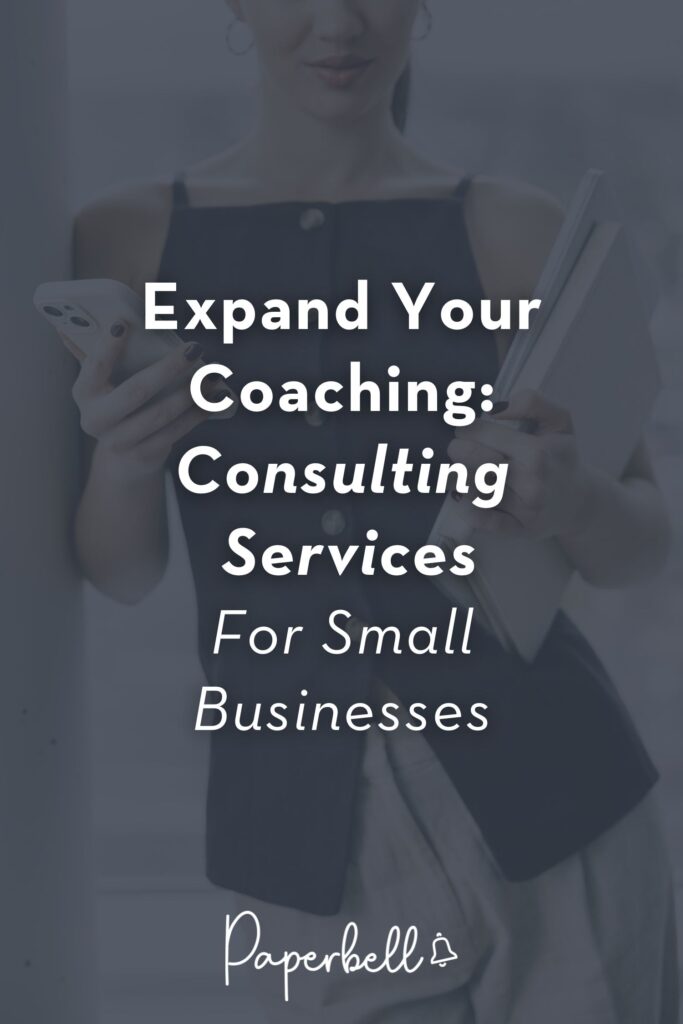If you’re a coach who’s been helping clients with their personal and professional development, you’ve probably noticed something.
Many of your clients who own businesses aren’t just looking to improve themselves… they’re trying to fix problems in their actual businesses.
Maybe they need help streamlining their operations, developing a marketing strategy, or figuring out why their sales have plateaued. But these aren’t coaching issues.
They’re consulting opportunities.
The line between coaching and consulting can feel blurry, especially when you’re working with entrepreneurs and business owners. But understanding the difference and knowing how to pivot when needed can open up entirely new revenue streams for your practice.
In this guide, we’ll explore what small business consulting really means, how it differs from coaching, and whether adding consulting services to your offerings makes sense for your business.
Is There Really Such a Thing as a Small Business Consultant?
Absolutely, and the distinction matters more than you might think.
A business coach focuses on helping small business owners achieve their objectives by:
- Developing skills
- Working on their mindset
- Forming new habits that lead to better outcomes
You’re working on the person behind the business.
A small business consultant, on the other hand, works directly on the business itself by:
- Analyzing systems and business data
- Recommending strategies
- Implementing solutions alongside the client to meet business objectives
Think about it this way:
If a client comes to you saying, “I don’t feel confident about sales conversations,” that’s a coaching conversation.
If they say, “Our sales process is broken and we’re losing 60% of qualified leads,” that’s a consulting project.
Small businesses often need both types of support, which is why many successful coaches with business acumen naturally expand into consulting work.
Small businesses typically turn to consultants when they’re facing specific, tactical challenges like:
- Inefficient processes that slow down operations
- Technology gaps that limit growth
- Strategic planning needs for expansion
- Business performance issues that require expert analysis
They seek coaches when the business owner or team needs to develop new capabilities or overcome limiting beliefs.
Pro tip: Paperbell makes it easy to offer both coaching and consulting services from the same platform, letting you seamlessly transition between different types of packages based on what your clients actually need.
Types of Small Business Consulting Services
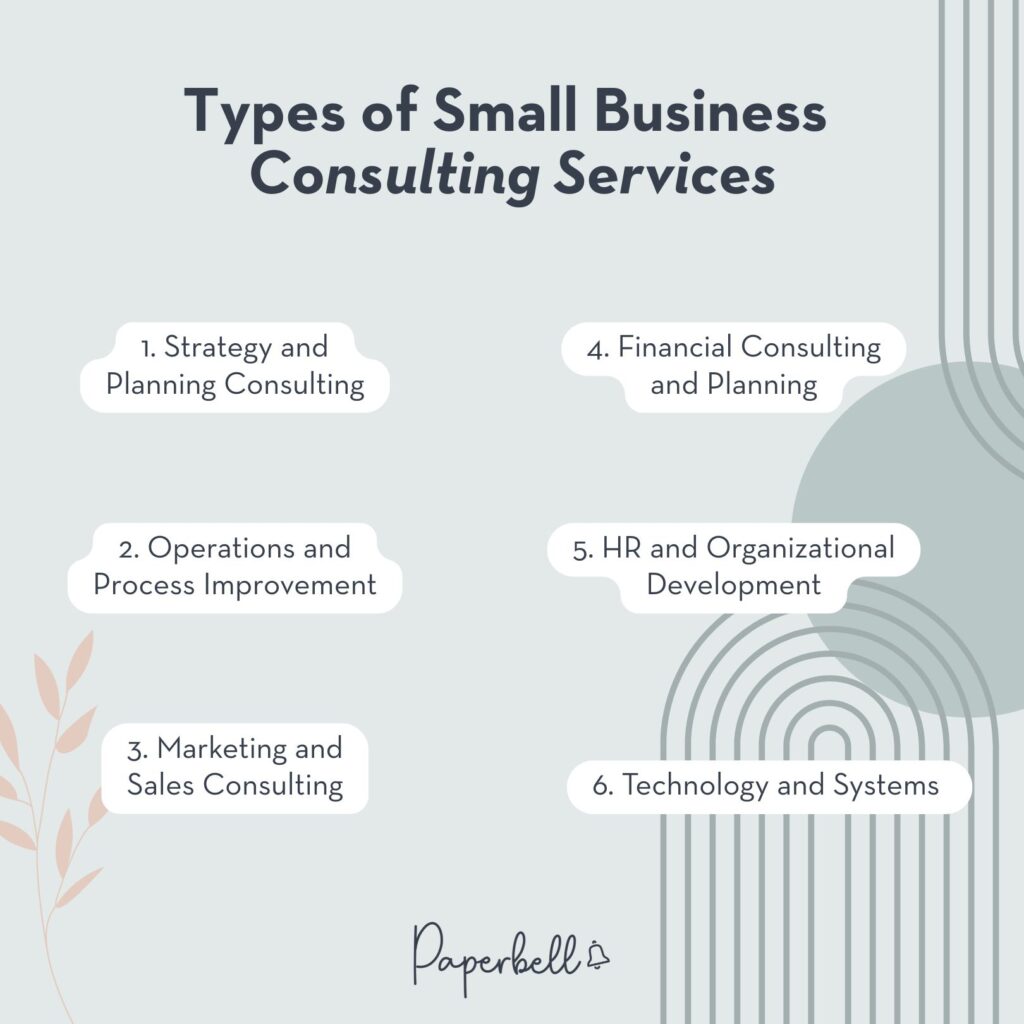
Most consulting services fall into a few key categories. Let’s go over the most common types of small business consultants.
1. Strategy and Planning Consulting
Strategy and planning consulting helps businesses figure out where they’re going and how to get there. This might involve:
- Market analysis
- Competitive positioning
- Developing three-year growth plans
If you’ve been coaching business owners on goal-setting and vision work, you likely have many of the foundational skills for the unique challenges of strategic consulting.
2. Operations and Process Improvement
Operations and process improvement focuses on making businesses run more efficiently. Consultants in this area might:
- Redesign workflows to eliminate bottlenecks
- Implement new systems for better productivity and operational efficiency
- Streamline communication processes and business administration
- Identify areas to optimize resource allocation
Many coaches who work with overwhelmed entrepreneurs find themselves naturally gravitating toward this type of work.
3. Marketing and Sales Consulting
Marketing and sales consulting addresses how businesses attract and convert customers. This could range from:
- Developing brand identities and messaging
- Optimizing sales funnels for sales growth
- Training sales teams or teaching new sales strategies
Many small businesses also look for ways to outsource marketing when they don’t have the internal team to handle strategy, content, or execution, which makes this type of consulting even more valuable.
If you have a proven track record helping clients with visibility, networking, or confidence around selling, you’re already touching on consulting territory.
4. Financial Consulting and Planning
Financial consulting and planning can involve:
- Budgeting and cash flow management
- Pricing strategies
- Financial forecasting
This does require more specialized knowledge. However, coaches who work with entrepreneurs often develop strong intuition around business finances to evolve into a consulting role.
5. HR and Organizational Development
HR and organizational development covers:
- Team building
- Company culture
- People management systems.
Many leadership coaches find that becoming HR consultants is a natural extension of their work, especially when their clients start hiring employees.
6. Technology and Systems
Technology and systems consulting helps small businesses choose, implement, and optimize the tools they need to operate effectively, such as:
- Information technology systems (IT systems)
- Network security tools
- Opportunities for digital transformation
This is increasingly important for success as businesses become more digital and remote-friendly.
How to Create a Small Business Consulting Package
Creating consulting packages feels different from building coaching programs, and that’s because the structure and outcomes are fundamentally different.
Coaching packages often focus on ongoing development and advice over time, but consulting engagements are typically project-based with specific deliverables and end dates.
When structuring consulting engagements, start by defining the specific problem you’re solving and the deliverables you’ll provide.
This should encapsulate your entire consulting process.
For example, instead of offering “marketing support,” you might offer “90-day customer acquisition strategy with implementation roadmap and performance tracking system.”
Being specific will give you a competitive edge over other industry experts who try to remain too general.
You don’t need to look any further than consulting franchises for the best examples of specific roadmaps in action. EOS implementer Jen Ramo showcases how she helps her clients implement the entire EOS process:
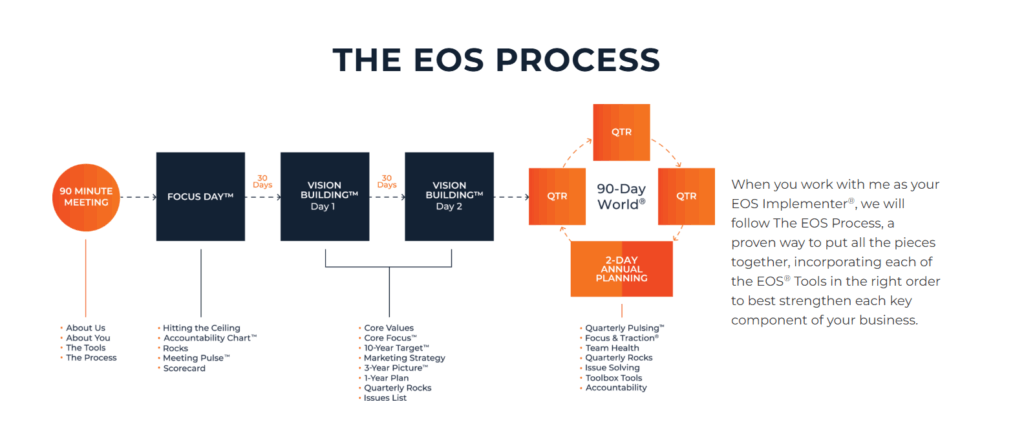
The scope of your consulting work needs to be much more detailed than a typical coaching package. You’ll want to specify:
- Exactly what’s included in the project, including specific areas of business covered
- What’s not included to prevent scope creep
- What happens if the project scope changes
- How additional work will be handled and billed
Setting project timelines and milestones becomes crucial in consulting work. Your clients need to know when they’ll see progress and when the final deliverables will be complete.
Consider building your consulting packages in phases. For example:
- Phase one might involve assessment and strategy development
- Phase two could focus on implementation planning and executing solutions
- Phase three might involve execution support or access to training
This approach makes larger projects feel more manageable and allows clients to invest gradually.
The pricing conversation also shifts when you move from coaching to consulting. Instead of ongoing monthly payments, you could:
- Charge per project
- Require payment in advance
- Work on a retainer basis for longer engagements
Paperbell Step-by-Step Guide for Consultants
The magic with Paperbell is that it can handle coaching as well as consulting packages! Let’s walk through how it works.
1. Create Your Free Paperbell Account
Click here to create your Paperbell account and start for free.
With your free account, you’ll be able to test and launch your first consulting package on your own custom consulting website!
2. Add a New Package
When setting up consulting packages in Paperbell, you can choose per pricing type or start from a template:
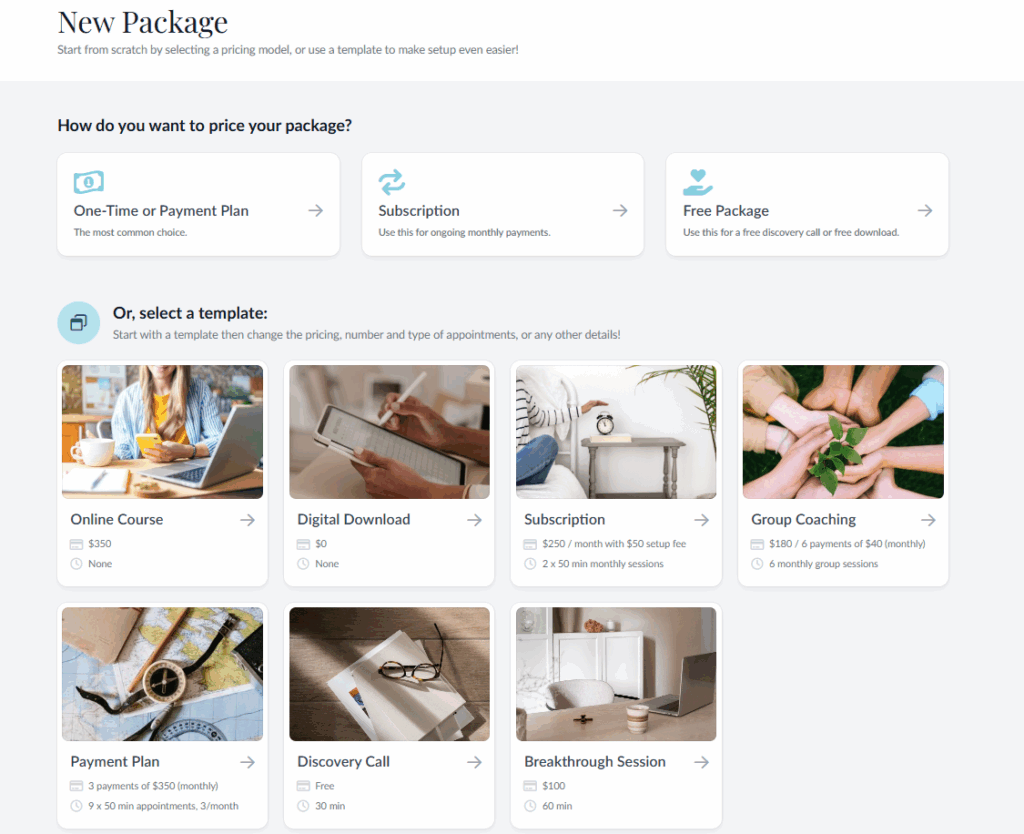
Let’s go with the Payment Plan option, since it fits best with milestone-based payments.
3. Customize Your Consulting Package
Inside your package settings, you can edit:
- How many appointments are included
- Pricing plans
- Surveys, contracts/proposals, and digital content (either available instantly or on a custom schedule)
- If you offer training in a group setting, you can include it here too
- Automated emails to simplify your admin workflow
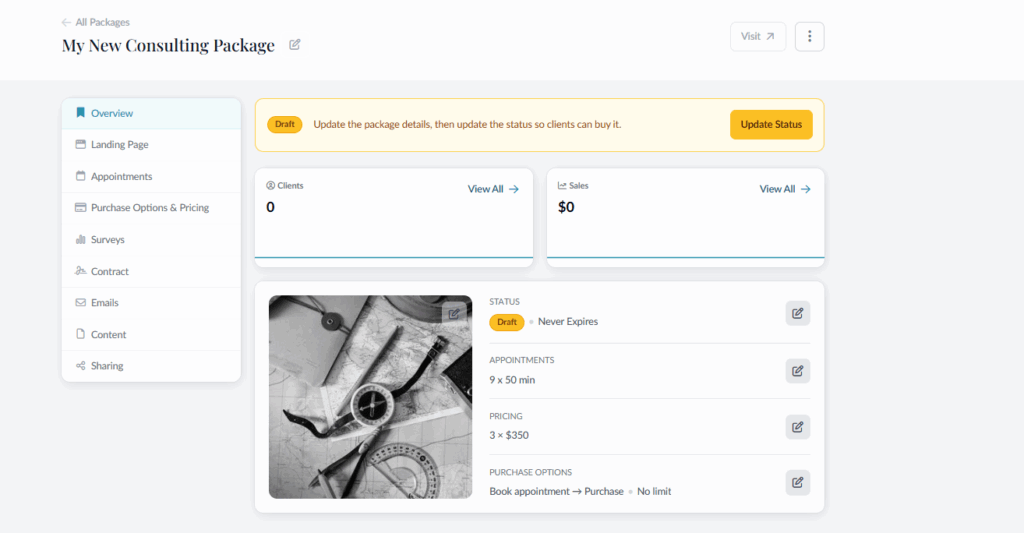
This is also where you’ll add:
- A cover image for your package
- A short teaser sentence that provides a quick overview of the package
- A longer description of what potential clients can expect from this package
4. Set Up Your Consulting Website in 5 Minutes
On the Website menu inside Paperbell, you’ll be able to customize your consulting website settings, including but not limited to:
- Branding elements such as colors, fonts, pictures, etc.
- Your website’s consulting tagline and description
- Whether you want to add FAQs, testimonials, examples of real-world experience, social media links, or an opt-in box
Once that’s done, your consulting package will already be live on your website!
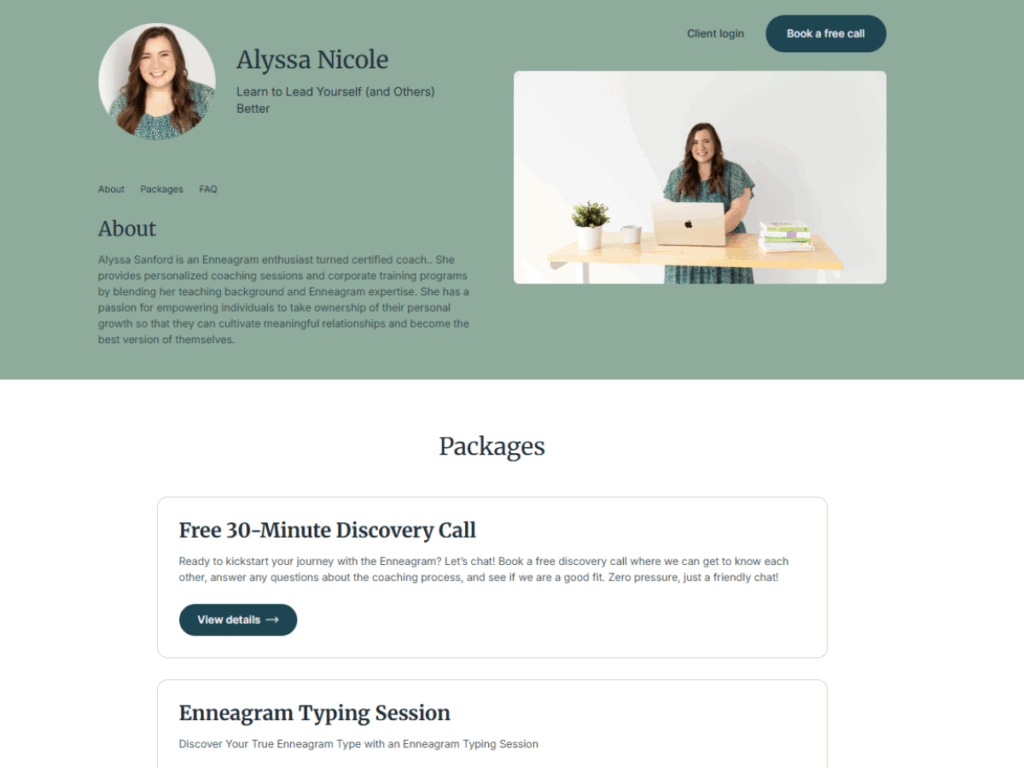
Pricing Your Small Business Consulting Services
Setting consulting rates requires a completely different mindset from pricing coaching packages.
That’s because coaching often focuses on the ongoing relationship and transformation, whereas consulting pricing reflects the specific value and outcomes you’re delivering.
Project-based pricing works well for consulting because businesses can see exactly what they’re getting for their investment. A marketing strategy project might cost $5,000 and include:
- Market research and competitive analysis
- Strategic recommendations with rationale
- Implementation roadmap with timelines
- Performance tracking and measurement plan
The client knows exactly what they’re paying for. Keep in mind that many small businesses work with limited budgets, so this type of breakdown is important to them.
Hourly pricing can work for consulting, but it often undervalues your expertise and makes it harder for clients to budget.
Retainer models make sense for ongoing consulting relationships. A business might pay you $3,000 per month for 10 hours of strategic consulting or a specific number of deliverables if you don’t charge hourly.
Market rates vary significantly based on your location, expertise, and the type of consulting you provide. For instance, Bark states that the average business consultant costs $75 per hour, with a maximum of $150 per hour.
But that’s not always the case.
I’ve hired consultants and paid up to $1000 per hour. When you search online to see what other consultants charge, you’ll find numbers all over the place.

If you’re not sure where to start, try value-based pricing.
This strategy focuses on the results you deliver rather than the time you spend. For example, one of my email marketing clients once hired a tax consultant who cost him $30,000, but saved him nearly $250,000 in business taxes.
The key to successful consulting pricing is understanding the specific value you bring to each client’s situation. As long as you can explain the value you bring, you can charge accordingly.
FAQ About Small Business Consulting Services
What are consulting services in business?
Consulting services help businesses solve specific problems through expert analysis, strategic recommendations, and implementation support. Unlike coaching which focuses on developing people, consulting directly improves business operations, strategy, and systems.
Are small business consultants worth it?
Small business consultants provide valuable expertise and objective perspectives that internal teams often lack. They can identify inefficiencies, implement best practices, and accelerate growth in ways that justify their investment.
How to start charging as a small business consultant?
Begin by identifying your area of expertise, research market rates in your region, and start with project-based pricing. Build credibility through initial results before raising rates or expanding into higher-value consulting services.
What qualifications do I need to become a small business consultant?
Most small business consultants need relevant industry experience, proven results in their specialty area, and strong problem-solving abilities. Formal certifications can help, but practical expertise and client results matter more than credentials.
Ready to Add Consulting to Your Coaching Business?
The opportunity to expand from coaching into small business consulting represents a natural evolution for many coaches. Your existing skills in listening, problem-solving, and guiding clients toward better outcomes translate beautifully into the consulting world.
The key difference is shifting from developing the person to improving the business instead.
Ready to start offering consulting services alongside your coaching?
Paperbell makes it simple to create, sell, and manage both types of packages from one platform. Try Paperbell free and see how easy it can be to expand your practice into small business consulting.
